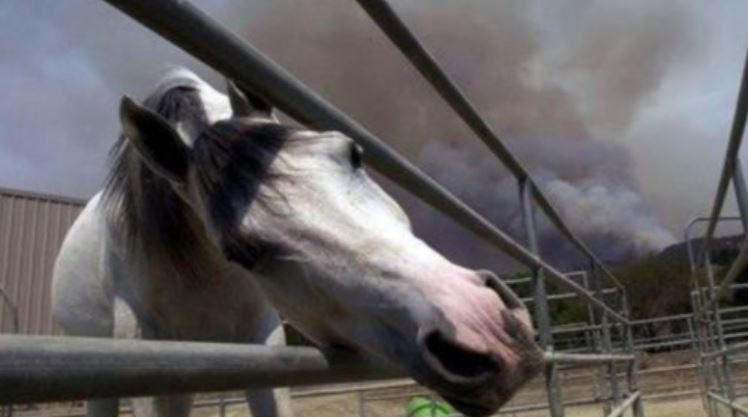Smoke Gets in Your Horses Eyes – Southern California Equestrians Help Their Horses Cope
Oct 14, 2020
Wildfires are the new normal. Until policymakers get serious about climate change by regulating carbon emissions, and people worldwide adopt a plant-based diet, the air will be unhealthful to breathe for extended periods more often.
UC Davis Veterinary college just published an article, excerpted here, helping horse owners deal with smoke. To read the entire article, click here.
How to protect horses from air pollution
Limit exercise when smoke is visible. Horses should not engage in activities that increase the airflow in and out of the lungs. This can trigger bronchoconstriction (narrowing of the small airways in the lungs).
Provide plenty of fresh water close to where your horse eats. Horses drink most of their water within 2 hours of eating hay, so having water close to the feeder increases water consumption. Water keeps the airways moist and facilitates clearance of inhaled particulate matter. This means the windpipe (trachea), large airways (bronchi), and small airways (bronchioles) can move the particulate material breathed in with the smoke. Dry airways make particulate matter stay in the lung and air passages.
Limit dust exposure by feeding dust-free hay or soak hay before feeding. This reduces the particles in the dust such as mold, fungi, pollens and bacteria that may be difficult to clear from the lungs.
If your horse is coughing or having difficulty breathing, contact your veterinarian. A veterinarian can help determine the difference between a reactive airway from smoke and dust versus a bacterial infection and bronchitis or pneumonia. If your horse has a history of having heaves or recurrent airway problems, there is a greater risk of secondary problems such as bacterial pneumonia.
If your horse has primary or secondary problems with smoke-induced respiratory injury, you should contact your veterinarian who can prescribe specific treatments such as intravenous fluids, bronchodilator drugs, nebulization, or other measures to facilitate hydration of the airway passages. Your veterinarian may also recommend tests to determine whether a secondary bacterial infection has arisen and is contributing to the current respiratory problem.
Give your horse ample time to recover from smoke-induced airway insult. Airway damage resulting from wildfire smoke takes 4-6 weeks to heal. Ideally, plan on giving your horse that amount of time off from the time when the air quality returns to normal. Attempting exercise may aggravate the condition, delay the healing process, and compromise your horse’s performance for many weeks or months. It is recommended that horses return to exercise no sooner than 2 weeks post smoke-inhalation, following the clearance of the atmosphere of all smoke. Horses, like all other mammals, tend to have an irritation to particles, but should recover from the effects within a few days.


 Facebook
Facebook
 X
X
 Pinterest
Pinterest
 Copy Link
Copy Link
